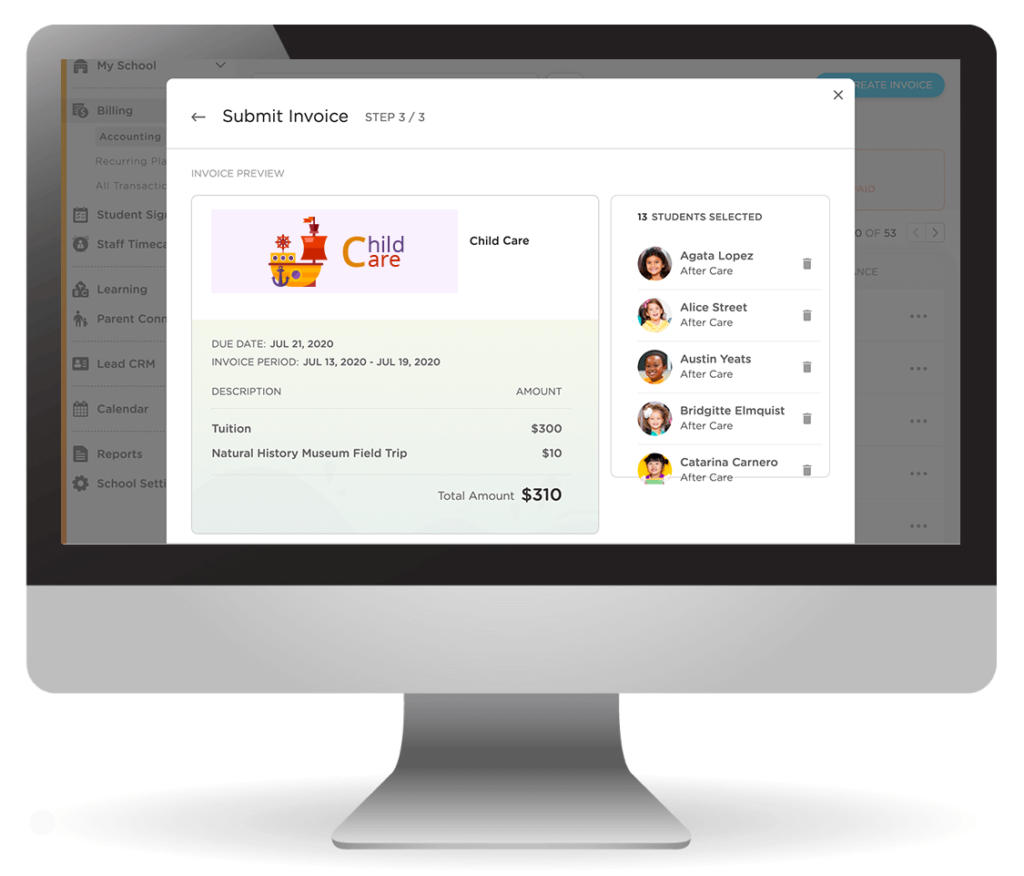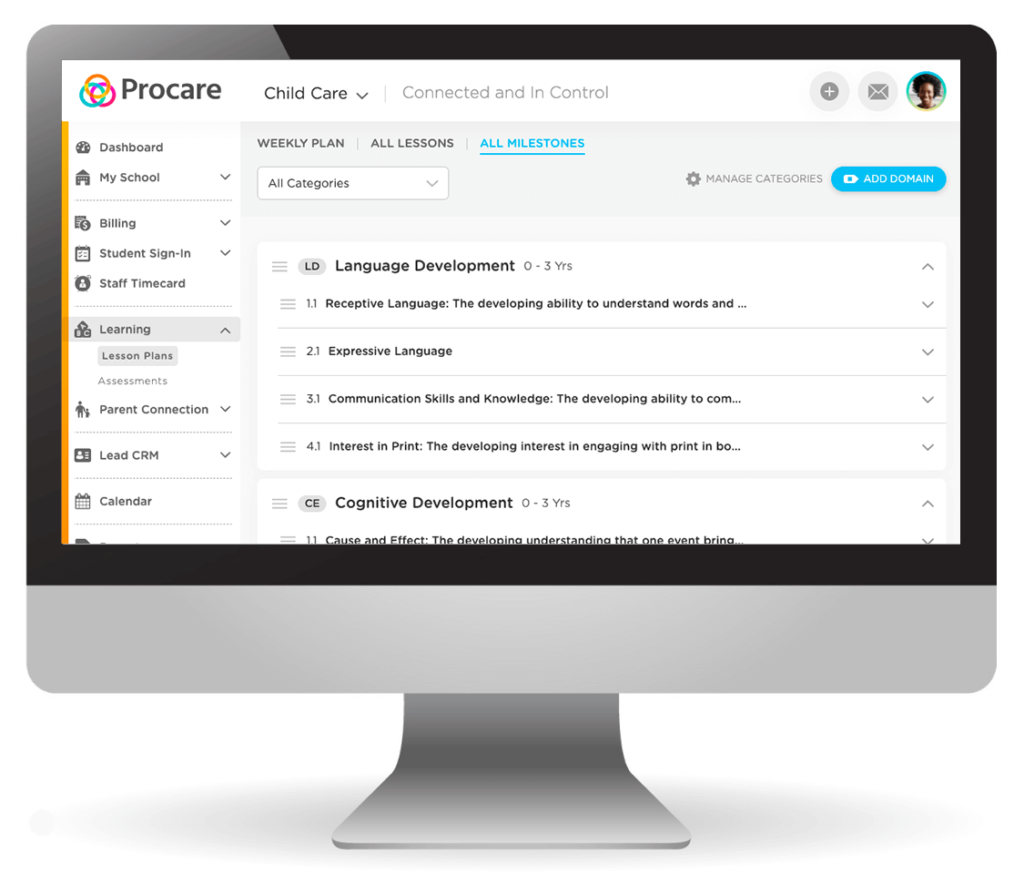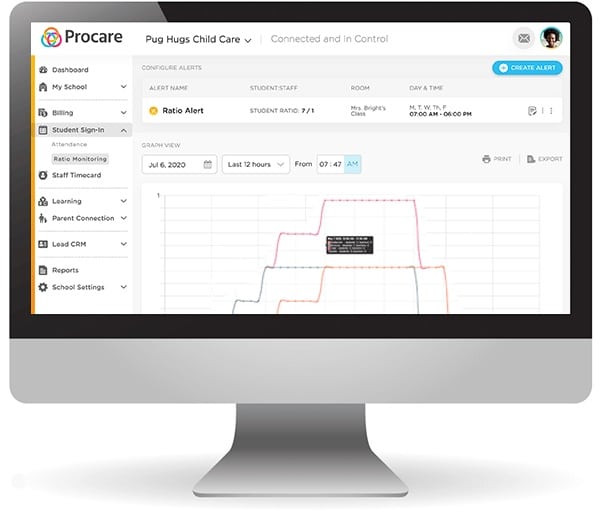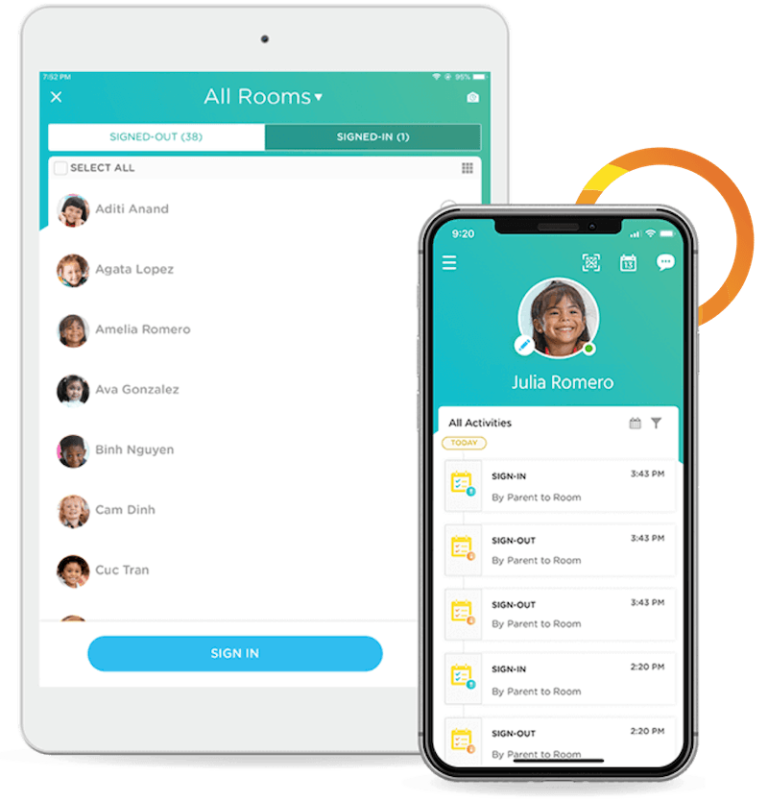
Today’s parents are savvy and discriminating when it comes to choosing the perfect child care setting for their kids. They know that this is no small decision, and they’ll come to your center armed with plenty of questions. To win over smart moms and dads, you’ll need to be prepared with answers.
Read on to find out the top 25 questions parents ask prospective daycare centers, and our tips for being ready to give an impressive response.
25 Daycare Questions Parents Ask
- Is your child care center licensed? Although not every child care center requires a license, centers above a certain size do need a license to operate in most states. Even if your center doesn’t, familiarity with the licensing requirements will reassure parents that you’ve done your legal homework. And if your center does require a license, the answer should always be an absolute “yes.”
- What is your center’s immunization policy? Many states have laws in place that require up-to-date immunizations for any child attending child care. Regardless of your state laws, a clear-cut immunization policy gives parents peace of mind that kids won’t catch or bring home preventable childhood illnesses.
- How does your center protect against COVID-19 transmission? Illnesses can spread in child care centers at the best of times. In 2021, COVID-19 is at the front of parents’ minds. Symptom screening for staff and kids, physical distancing, thorough hygiene procedures and mask-wearing when possible should be part of your center’s daily routine.

- How do you secure your child care facility? Parents want to know that you’re doing everything you can to keep kids safe from outsiders and from wandering off on their own. Staff-supervised entries and exits, visitor logs, locked doors, cameras and even sophisticated biometric equipment are just some of the potential tools in your arsenal.
- How does your child care center communicate with parents? Communication is key to building good relationships with families. Knowing how and when to expect updates reassures parents that those relationships are a priority for your center. Make sure you have a set update schedule, with an outline of what information will be included in each report, as well as a plan for how special updates will be relayed. And consider using a parent engagement app, which will help you stay connected with parents when physical distancing is the norm.
- How does your child care center respond to emergencies? With a solid emergency plan, the unexpected doesn’t have to take you off guard. Regular fire drills, evacuation procedures and an accessible, well-stocked emergency kit will keep kids safe and put their parents’ minds at ease.
- How does your child care center take payment? Offering easy, convenient payment methods — especially online and automatic payments — is one way your center can make itself an attractive option to busy parents.

- Are there extra fees? Holiday parties, field trips and other special events are a lot of fun at a child care center, but no parent wants to be hit with unexpected fees. Let parents know whether they can expect to pay a bit extra for bonus activities. Other forms of accepted contributions, such as providing transportation or snacks, can help make things equitable for parents with financial constraints.
- What are your visitation policies for parents? Parents enjoy dropping in to see their kids from time to time. If possible (and when it’s safe), these visits should be encouraged. Accommodating visits allows you to strengthen engagement between your center and families. Plus, your openness will show accountability and foster trust.
- Do you serve healthy meals for kids? With a bit of planning, serving healthy meals can be easy, tasty and affordable. Detailed menus showing how meals fit into current nutritional guidelines are helpful both to you and parents who want to understand what kids will eat at your center.
- What are your daily or weekly rates for child care? Competitive pricing gives your center an edge, but it’s also important to show where that money is going. Whatever your rates, help parents understand the value of what you offer and what sets your center apart.
- What are your operating hours? This one might be self-explanatory: parents will want to know if your center is compatible with their schedule. Understanding the needs of families in your community will help you set hours that work for your business.
- Which days of the year does your child care center close? Some child care centers operate over the summer and on holidays, while others stick more closely to the schedule of public schools. Make sure parents know whether they’ll have to make alternate child care arrangements during those times.
- What are your designated pick-up and drop-off times? Is there any flexibility? Especially in homes where both parents work, not everyone can follow a typical schedule. Parents appreciate centers that don’t force them to rearrange their lives to get their kids in the evening, and understand that sometimes things pop up that prevent timeliness.
- What curriculum does your child care center follow? A well-thought-out curriculum based on solid child development principles is what sets a great child care center apart. Help parents understand your educational philosophy by explaining your curriculum model, sharing lesson plans and letting them sit in on classes.

- How does your center handle potty training? Some centers require that children are potty-trained before enrollment. But if not, you should let parents know what they can expect for kids who are transitioning out of diapers, such as whether staff help will with potty training, and how accidents are dealt with.
- Does your center offer transportation services? Offering transportation to and from school is a great way to make it more convenient for kids to attend your center. Make sure parents know the drop-off and pick-up procedure, the type of vehicle and the safety precautions you’ll follow.
- How qualified are your child care providers? Child care providers should have at least some education, such as a diploma, in early childhood education, child development or a related field. Other qualifications, such as first aid and CPR classes, safety certifications, curriculum-based training and other professional development, will help add to the impressive resumes of your staff.
- What if my child needs medical care? Being prepared to deal with children’s medical needs is part of offering an equal-opportunity center that acknowledges the diverse needs of each child. Parents will want to know who is authorized to administer medications and other treatments, and what will happen if there is a medical emergency.
- How does your center hire staff members? A well-vetted staff with highly qualified child care providers and low turnover is a sign of a well-functioning center. Showing parents your high standards for caregivers lets them rest assured that their children will be in the hands of empathetic, caring and responsible staff at all times.
- How does your center handle bullying or other behavior issues? Just as with parents, child care centers can range in their approach from permissive to disciplinary, so families want a center that matches their own thinking. But most importantly, discipline should be handled fairly and consistently, with rules and consequences known in advance.
- What are the staffing ratios at your center? Staffing ratio is an important factor in ensuring that each child gets the care and attention they need, especially at younger ages. Parents will look for a high degree of individual care for each child, so make sure your staff ratios are tracked and adhere to state guidelines at all times.

- What if my child doesn’t like the facility? Above all, both you and families want kids to be happy in your center. Some kids are bigger fans of daycare than others, but for those who have trouble, reassure parents that you can work with them and their kids to find the root of the problem and make your center a special place for each child.
- Can you provide references from other families or community institutions? Understanding your reputation in the community is a great way to communicate your value to prospective parents. When you receive positive feedback, seek out references and testimonials so that you’ll have contacts at the ready when new parents ask.
- What can I do if I have concerns in the future? It’s one thing to say everything right at the interview, but sending your kids to daycare can still be a nerve-wracking decision. Keeping the lines of communication open and genuinely hearing parents’ feedback will set you up for great family relationships in the years to come.
Be Prepared for Everything with Procare Solutions

Running a child care center comes with many responsibilities, but at its heart, each center shares the simple goal of enriching children’s lives. Our goal is to make it easy to deliver outstanding child care and foster parent engagement by easing all the other burdens involved in running a child care business.
For 30 years, we’ve helped child care centers streamline complex processes like billing, compliance and bookkeeping, while making life easier for teachers, administrators and parents. No matter the size of your center, Procare’s child care management software can connect your operations so you can focus on what matters most: better outcomes for the children in your care.
Ready to find out how Procare can help your center be the place every parent wants to send their kids?



